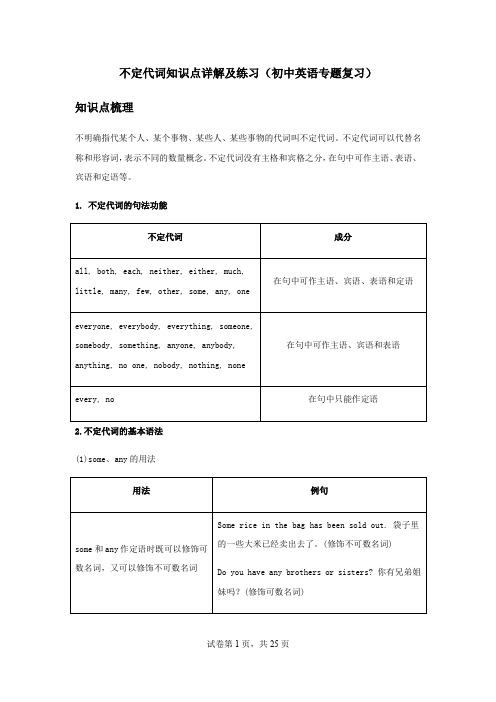初中英语不定代词讲解及习题
初二不定代词练习题及答案

初二不定代词练习题及答案不定代词是英语语法中的一个重要部分,它们在句子中起到代替名词的作用。
对初二学生来说,学习和掌握不定代词的用法是很重要的。
本文将为大家提供一些不定代词练习题及答案,帮助大家更好地理解和记忆不定代词的用法。
练习题一:填入适当的不定代词,使句子完整和正确。
1. I saw __________ on the street yesterday.2. Would you like __________ to drink?3. __________ of them can speak French.4. __________ is a pen on the desk.5. She has __________ interesting book.答案一:1. someone2. something3. None4. There5. an练习题二:选出括号中适当的不定代词填空。
1. He has __________ income. (little / few)2. Could you lend me __________ money? (some / any)3. There are __________ people in the park. (many / much)4. I have __________ news to tell you. (some / a few)5. There is __________ wrong with my phone. (nothing / anything)答案二:1. little2. some3. many4. some5. nothing练习题三:将括号中的句子改写为含有不定代词的句子。
1. He told me the truth. (He told me __________)2. Sarah isn't going to the party. (__________ isn't going to the party)3. We have some coffee in the kitchen. (We have __________ coffee in the kitchen)4. They saw a dog in the park. (They saw __________ dog in the park)5. She ate an apple for breakfast. (She ate __________ for breakfast)答案三:1. He told me something.2. Someone isn't going to the party.3. We have some coffee in the kitchen.4. They saw a dog in the park.5. She ate something for breakfast.练习题四:选择正确的不定代词填空。
初中不定代词讲解及练习

不指名代替任何特定名词或形容词的代词叫做不定代词。
常见的不定代词有 all, each, both, either, neither, one, none, little, few, many, much, other, another,等,以及由 some, any, mething 等)。
some, any, no, (a) few, (a) little, both, enough, every no 和 every 构成的合成代词(即 somebody, someone, so有些不定代词用于指两者 (如 both, either, neither)有的不定代词用于指三者 (如 all, any, none, every)Both of my parents are doctors. 我的父母都是医生。
All of the students are interested in it. 所有的学生对此都很感兴趣。
There are trees on any side of the square. 广场的每一边都种有树。
He has two sons, neither of whom is rich. 他有两个儿子,都不富有。
He has three sons, none of whom is rich. 他有三个儿子,都不富有。
each 可用于两者、三者或三者以上,而 every 只用于三者或三者以上,因此用于两者时只能用 each ,不能用 every 。
如:不能说 There are trees on every side of the road.复合不定代词包括 something, somebody, someone, anything, anybody, any one, nothing, nobody, no one, everything, everybody, everyone 等。
初中英语完整不定代词的用法讲解及练习题(含答案)

不定代词的用法1.some,any(1)some多用于肯定句,修饰复数可数名词和不可数名词,作“一些”解。
它还可修饰单数可数名词,作“某一”解。
如:H-5avian influenza first broke out in some Asian countries.H-5型禽流感首先在亚洲爆发。
Some people are early risers.有些人起得很早。
(2)any通常用于否定句、疑问句或条件句,修饰单数或复数可数名词以及不可数名词。
If there are any new magazines in the library,take some for me.图书馆如果来了新杂志,替我借几本。
Are there any stamps in the drawer?抽屉里有邮票吗?Is there any money with you?你身上带钱了吗?(3)any还可以用于肯定句,作“任何的”解。
You can come here any time.你什么时候来都行。
You can get it at any shop.你可以在任何一家商店买到它。
2.either,both,all(1)either表示“两者中的任何一个”。
Either of the brothers is selfish.两兄弟都非常自私。
Either will do.两个都行。
(2)both“两个都”,修饰可数名词,统指两者。
Tom and Jack both made some progress.汤姆和杰克两个都有所进步。
Both of them should make concessions.他们双方都应做出让步。
(3)all“全部,所有的”,修饰可数名词和不可数名词,指两个以上的人或物。
All the students contributed to the fund.所有的学生都为基金会捐了款。
All of the money has been spent.钱都花完了。
初中英语专题讲练: 不定代词(含解析)

不定代词知识精讲一、不定代词的定义:不指明代替任何特定名词或形容词的代词叫做不定代词。
不定代词在句中可以作主语、宾语、表语或定语等。
不定代词可以分为一般不定代词和复合不定代词。
二、一般不定代词及用法1. some/any含义:“一些”,既可以修饰可数名词,也可以修饰不可数名词。
区别:1). some用于陈肯句;any用于疑问句或否定句。
例:I can see some flowers, but I can`t see any apples.2). some 用在疑问句中有表示请求或建议的功能;any用在肯定句中有强调或加强语气的功能,意为“任何”。
Would you like some coffee?You may come at any time.2. many/much注意:“many”和“much”前可有so, too等词进行修饰。
如:There are too many mistakes in your diary.So many people are waiting for the bus.Sorry, I’m afraid I can’t go with you. I’ve got too much work to do.3. few/a few/little/a little例:He has a few friends.他有几个朋友。
He has few friends. 他几乎没有朋友。
We still have a little time. 我们还有点时间。
There is little time left. 几乎没剩下什么时间了。
4. both, either, neither, all, every, none5. “other” 、“another”、“others”和“the others”例:I have two pencils. One is yellow, the other is red.I don’t like this green pe ncil, please give me another one.In our class, some students like playing football, others like playing basketball.There are seven people in Running Man. One is a woman, and the others are men.三、复合不定代词及用法1. 复合不定代词的构成:复合不定代词是由some-,any-,no-,every-加上-one,-body,-thing 所组成的不定代词。
不定代词知识点详解及练习(初中英语专题复习)

Not all books are good.(= All books are not good. 不是所有的书都是好书。
知识拓展:all作主语,指代人时,谓语动词使用复数形式,指代事情时,谓语动词一般使用单数;作同位语时,all在句中的位置与both相同。
(5)复合不定代词的用法
由some,any,every,no与one,body,thing一起构成的代词叫复合不定代词,如something,everybody,anyone,nothing等。由one和body构成的复合不定代词可相互换用。
用法
例句
复合不定代词一般用作单数,在句中作主语、宾语或表语
If you have any questions, please ask me. 如果你有问题,可以问我。
Any child needs love. 任何一个孩子都需要爱。
some和any可以用来修饰单数名词,some表示"某一";any表示"任何的"
Any student can answer this question. 任何学生都可以回答这个问题
some多用于肯定句;在表示请求、劝告、邀请、或不希望对方拒绝的疑问句中用some而不用any
Some of the boys are good at swimming. 一些男孩擅长游泳。
Will you give me some water? 请给我一些水好吗?
any多用于疑问句、否定句和条件状语从句中;用于肯定句中,表示"任何"
little不多,没有什么
知识拓展:
初中英语不定代词讲解及习题(K12教育文档)

初中英语不定代词讲解及习题(word版可编辑修改)编辑整理:尊敬的读者朋友们:这里是精品文档编辑中心,本文档内容是由我和我的同事精心编辑整理后发布的,发布之前我们对文中内容进行仔细校对,但是难免会有疏漏的地方,但是任然希望(初中英语不定代词讲解及习题(word版可编辑修改))的内容能够给您的工作和学习带来便利。
同时也真诚的希望收到您的建议和反馈,这将是我们进步的源泉,前进的动力。
本文可编辑可修改,如果觉得对您有帮助请收藏以便随时查阅,最后祝您生活愉快业绩进步,以下为初中英语不定代词讲解及习题(word版可编辑修改)的全部内容。
不定代词一、不定代词概述二、常见不定代词的基本用法1、some和any: 都是“一些"的意思,都可与可数名词复数或不可数名词连用。
(1)some一般用于肯定句中,any 一般用于否定句或疑问句中。
Eg. ______________________________________________________________________________________________________________________(2)在表示请求、建议或希望得到肯定回答的疑问句中,应该用some而不用any。
Eg. Would you please give me some paper?___________________________________________________________(3)当any 表示“任何”或“无论哪一个”的意义时,可以用于肯定句,此时any要重读。
Eg。
You may come at any time that is convenient to you。
___________________________________________________________2、表示数量的不定代词(1)many______, few_______, a few_______, 用以代替或修饰可数名词。
初中英语---不定代词用法辨析与例题分析

⑤any 用于肯定陈述句或条件状语从句中时,意为“任何的,任何一个的”, 其后接名词单数形式。如:
You can take any book. They are all yours. // If you have any quention, please let me know.
Jim can run faster than any other student in his class.
or that one? ---- Both.
③all和both既可以修饰名词(all/both+(the)+名词),也可 以独立使用,采用“all/both + of the +名词(复数)”的形式, 其中的of 可以省略。如:All (of) (the) boys are naughty.
⒋ every和each的用法辨析: ①every是形容词,只能作定语修饰单数名词,意思是“每一个”,表示整
⑤the others表示特指某范围内的“其余的人/物”,(指全部)。如: Two of the ten boys are standing and the others are sitting round them.
⒎ all和every的用法辨析: all和every都表示“全部、所有的”等概念。all后的谓语动词多用复数 形式,而every后的谓语动词用第三人称单数形式。如:All students study hard in my class. // Every student studies hard in my class.
⒑ one、ones、that 和it的用法辨析: ①one代替上文提过的同类事物或人中的任何一个,表示泛指。如: I can’t find my hat. I think I must buy one. (不定) He has lost his bike. He wants to buy a new one. 他弄丢了自行车,他想
不定代词讲解及练习总结

不定代词讲解及练习总结1. 不定代词的定义不定代词是一类特殊的代词,用来指代人或事物,但没有具体指向的对象。
它们可以在句子中作主语、宾语或定语,并且具有不确定性。
常见的不定代词有:somebody, anybody, nobody, something, anything, nothing等。
2. 不定代词的用法不定代词在句子中的位置和用法与普通的代词相似,根据具体语境决定。
2.1 主语位置不定代词可以作为句子的主语,例如:- Somebody called me yesterday.(有人昨天给我打电话。
)- Anything is possible.(一切皆有可能。
)2.2 宾语位置不定代词可以作为及物动词的宾语,例如:- I can't find anybody here.(我在这里找不到任何人。
)- Have you seen something strange?(你见过什么奇怪的东西吗?)2.3 定语位置不定代词可以用作名词的修饰语,例如:- Is there anything important in the letter?(信中有重要的东西吗?)- I need somebody reliable to help me.(我需要一个可靠的人来帮助我。
)3. 不定代词的练为了更好地掌握不定代词的用法,以下是一些练题:3.1 单项选择题a) Everybodyb) Nobodyc) Anybody2. I don't have ____ to wear to the party.a) somethingb) anythingc) nothing3. ____ is waiting for you outside.a) Somebodyb) Anybodyc) Nobody3.2 句子改写题将以下句子改写成含有不定代词的句子:1. We have a lot of books.(改写成含不定代词的句子)2. The teacher needs a volunteer.(改写成含不定代词的句子)4. 总结不定代词在英语中起着重要的作用,它们可以用来指代不确定的人或事物,并且可以在句子中的不同位置使用。
- 1、下载文档前请自行甄别文档内容的完整性,平台不提供额外的编辑、内容补充、找答案等附加服务。
- 2、"仅部分预览"的文档,不可在线预览部分如存在完整性等问题,可反馈申请退款(可完整预览的文档不适用该条件!)。
- 3、如文档侵犯您的权益,请联系客服反馈,我们会尽快为您处理(人工客服工作时间:9:00-18:30)。
不定代词二、常见不定代词的基本用法1、some和any: 都是“一些”的意思,都可与可数名词复数或不可数名词连用。
(1)some一般用于肯定句中,any 一般用于否定句或疑问句中。
Eg. ______________________________________________________________________________________________________________________(2)在表示请求、建议或希望得到肯定回答的疑问句中,应该用some而不用any。
Eg. Would you please give me some paper?___________________________________________________________(3)当any 表示“任何”或“无论哪一个”的意义时,可以用于肯定句,此时any要重读。
Eg. You may come at any time that is convenient to you.___________________________________________________________2、表示数量的不定代词(1)many______, few_______, a few_______, 用以代替或修饰可数名词。
(2)much______, little_______, a little________,用以代替或修饰不可数名词。
(3) _______和_______表示肯定意义,_______和_______表示否定意义。
(4)a lot of 和plenty of 等短语既可以修饰可数名词,又可以修饰不可数名词。
3、表示两者和三者的不定代词(1)表示两者: both, either, neither (2)表示三者: all, any, none, every(3)表示肯定:both, all (4)表示否定:none, neither练一练:用以上不定代词填空。
我的父母都是医生。
__________________________________街道的两边都种了树。
There are trees on ______ sides of the street.= There are trees on ______ side of the street.他有两个儿子,都不富有。
He has two sons. ______ of them is rich.他有三个儿子,都不富有。
He has three sons. ______ of them is rich.三、复合不定代词的用法(1)复合不定代词somebody ,something ,anything, nothing ,everything, everybody等是由some , any ,no ,every, 加上body, thing 构成的,叫做复合不定代词,在句子中当单数使用。
(2)somebody, something, someone 一般用于肯定句中;anything, anybody, anyone一般用于疑问句和否定句中。
(3)如果要在疑问句中表示请求、建议等肯定的意思或者盼望得到肯定的答复时,用somebody, someone 或something。
(4) 修饰复合不定代词的形容词或不定式应放在它们的后面。
Eg. He has nothing much to do today.他今天没有多少事情做。
Lucy hasn’t anything important to do. 露西没有任何重要时做。
四、疑难拓展1、few/a few/little/a little(1)后接名词的不同。
_______和_______后接可数名词复数,_______和_______后接不可数名词。
Eg. There are _______ new words in the text. 课文中有一些新单词。
Can you speak _______ English? 你能说一点英语吗?(2)表示肯定意义和否定意义的区别。
_______和________ 表示肯定,______和_______表示否定。
Eg. I have ________ friends there. I often play with them.They told us all to wait here.(all 修饰的宾语是代词)3、one 和it 的区别使用(1)it 指代前面的某物。
Eg. Where is my pen? I can’t find it.(it 指代前面提到的那支笔)(2)one可以指人,也可以指物。
用来代替上文中提到的单数可数名词以及避免重复,其复数形式为ones。
Eg. Your pen is so nice. I want to buy one like this.课堂演练一、单选。
1.The two fishermen saw_______ in the sky while they were fishing by a river.A. something strangeB. anything strangeC. strange somethingD. strange anything2. --- Is ____ here? ---No. Bob and Tim have asked for leave.A. anybodyB. somebodyC. everybodyD. nobody3.---Do you want tea or coffee? ---______.I really don't mindA. BothB. NoneC. EitherD. Neither4. The old man has two sons .One is a soldier, _______ is a worker.A. otherB. the otherC. othersD. another5. There are shops on _____ side of the street.________ of them do not close till 12 at night.A. both; AllB. every; NoneC. either; SomeD. other; Many6. There is not ___ meat in my bowl. There is ____ chicken in it.A. some; anyB. any; someC. any; anyD. some; some7. Could you do___for me, please?A. everythingB. nothingC. somethingD. anything8. Sorry, I can't answer your question. I know____ about the subject.A. a littleB. littleC. fewD. a few9. ---Which would you like, a cup of tea or a glass of milk?----____, thanks. I think I'll just have a glass of water.A. NoneB. NeitherC. BothD. Either10. Tom shook his head and said to us there was _____ in the classroom.A. anybodyB. nobodyC. somebodyD. everybody11. Could I have _____ bottle of apple juice, please?A. anotherB. otherC. some moreD. second12. There are 25 techers in this grade. Eight of them are women teachers and ______ are menteachers.A. the otherB. the othersC. othersD. other13. They were all tired, but _____of them took a rest.A. noneB. allC. bothD.either14. ---We have red and yellow T-shirts. Which colour do you like?--- I’m afraid ____. I think blue will be OK.A. bothB. eitherC. neitherD. none15. ---Can I come this afternoon o tomorrow morning?---_____ is OK. I’m free today and tomorrow.一、单选。
1.The teacher asked the boy many questions, but he only ansewered ______ of them.A.someB. lotsC. eachD. few2. ---I need something for cutting the paper. ---Oh, you want a knife? OK, I’ll get ___ for you.A. itB.thatC. thisD.one3.Two places of inteerest in Beijing are well known to people from home and abroad. One is the Great Wall, and _____ is the Summer Palace.A. the otherB. anotherC. otherD. others4. ---Would you like _____ to drink? ---Yes. I’d like a cup of coffee.A. something elseB. else somethingC. anything elseD. else anything5. Maybe the disaster can destroy our homes, but ______ can destroy the love in our people.A. somethingB. everythingC. anythingD. nothing。
